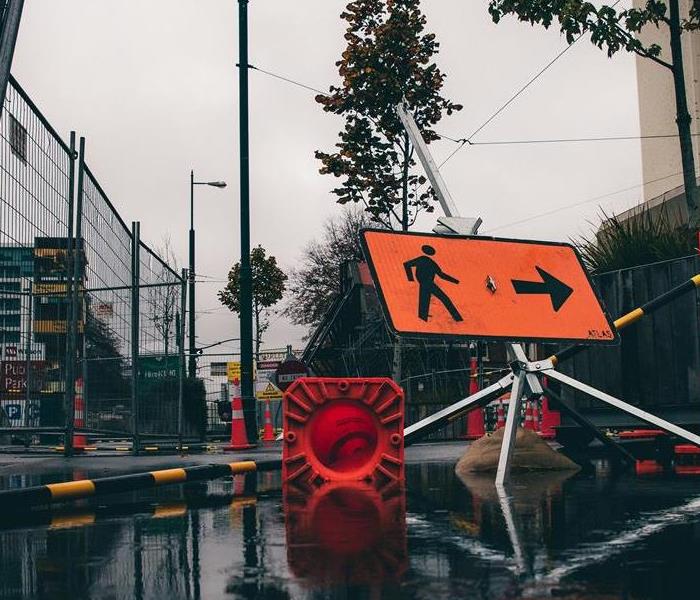What To Do If Your Apartment Complex Floods: A Comprehensive Guide To Safety and Recovery
9/11/2024 (Permalink)
Flooding can be devastating and overwhelming, significantly when it impacts your home. Knowing how to respond if your apartment complex is flooded can ensure substantially your safety and minimize damage.
Here’s a comprehensive guide on what to do if your apartment complex floods. It covers immediate actions, safety tips, and steps for recovery.
What Should My First Steps Be When Experiencing A Flood?
Dealing with a flood in your apartment complex can be challenging, but taking the proper steps can help ensure your safety and facilitate a smoother recovery process.
You can navigate this complex situation more effectively by staying calm, prioritizing safety, documenting the damage, and seeking professional assistance. Remember, the key is to act promptly and methodically to protect yourself and your property. Doing so lets you take control of the situation and minimize the potential damage.
Immediate Actions
Ensure Personal Safety
- Stay Calm: Panic can lead to poor decision-making. Stay as calm as possible to think clearly.
- Avoid Floodwaters: Do not walk or drive through floodwaters. They can be more profound than they appear and potentially contaminated.
- Move to Higher Ground: If water rises inside your apartment, move to a higher floor if it’s safe. Avoid using elevators.
Evacuate if Necessary
- Follow Evacuation Orders: If local authorities issue an evacuation order, leave immediately. Take only essential items like medications, identification, and important documents.
- Turn Off Utilities: If it’s safe and you have time, turn off electricity, gas, and water to prevent further hazards.
Communicate
- Notify Authorities: Contact emergency services if you or someone else is in immediate danger.
- Inform Your Landlord: Immediately inform your property manager or landlord about the flooding.
Safety Tips During a Flood
Avoid Electrical Hazards
- Don’t Touch Electrical Equipment: Avoid using electrical appliances or touching outlets and switches if wet or standing in water.
- Shut Off Power: If the electrical panel is accessible and safe, turn off the power to prevent electrical shocks and fires.
Be Aware of Structural Risks
- Watch for Structural Damage: Flooding can weaken walls, floors, and ceilings. Be cautious and avoid areas that appear structurally unsound.
- Check for Gas Leaks: If you smell gas or hear a hissing sound, leave the area immediately and call the gas company.
Prevent Health Risks
- Avoid Contaminated Water: Floodwater can contain sewage, chemicals, and other hazardous substances. Avoid contact with floodwater whenever possible.
- Use Protective Gear: Wear rubber boots, gloves, and masks when dealing with floodwater to protect yourself from contaminants.
Steps for Recovery
Document the Damage
- Take Photos and Videos: Document the damage thoroughly for insurance purposes. Capture images of all affected areas and belongings.
- Make a List of Damaged Items: Create a detailed inventory of damaged items, including their approximate value and purchase date.
Contact Your Insurance Company
- File a Claim: Notify your renter’s insurance company about the flood and start the claims process. Provide them with your collected documentation.
- Keep Records: Maintain a log of all communications with your insurance company and keep copies of any forms or correspondence.
Begin Cleanup and Repairs
- Dry Out Your Apartment: If it’s safe to return, dry out immediately to prevent mold growth. Use fans, dehumidifiers, and open windows to circulate air.
- Remove Wet Items: Remove waterlogged items to avoid further damage and mold growth. Dispose of items that cannot be salvaged.
- Clean and Disinfect: Clean all surfaces with disinfectants to remove contaminants from the floodwater.
Seek Professional Help
- Hire Restoration Experts: Consider hiring a professional restoration company to handle extensive water damage and mold remediation.
- Consult with Contractors: For significant repairs, consult with licensed contractors to ensure the work is done safely and to code.
Take Care of Yourself
- Address Emotional Stress: Floods can be traumatic. If you feel overwhelmed, seek support from friends, family, or professional counselors.
- Stay Informed: Stay updated on local news and weather reports to learn about any ongoing risks or recovery resources available.
Contact your local disaster restoration professionals immediately!
Why Is SERVPRO My Go-To Restoration Company?
The SERVPRO team is ready to assist you with water damage to your Attica home or business any time of the day or night:
- We offer 24-hour Emergency Service
- We Are Faster to Any Size of Disaster
- We Are Highly Trained Water Restoration Technicians
- We Are A Trusted Leader in the Water Restoration Industry
- We Are Locally Owned and Operated
- We Provide Advanced Water Inspection, Extraction, and Drying Equipment
SERVPRO of Huron & East Seneca Counties is here to help you with emergencies. In addition to our water damage services, we can assist you in recovering from storm damage, mold infestations, odor removal and deodorization, and much more. Call us at (419) 443 1790 to learn more about our Attica home and commercial restoration processes.
This franchise is independently owned and operated.






 24/7 Emergency Service
24/7 Emergency Service
